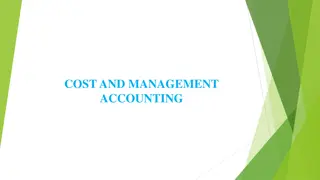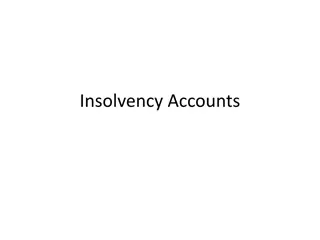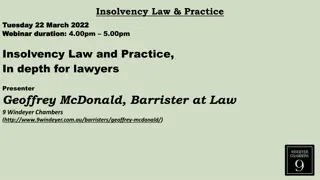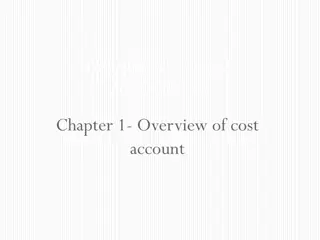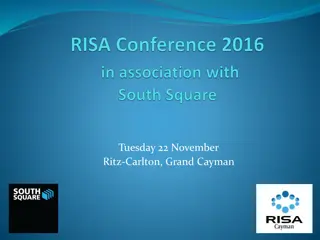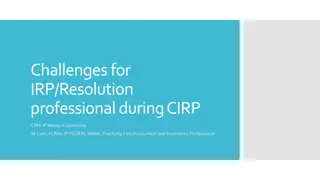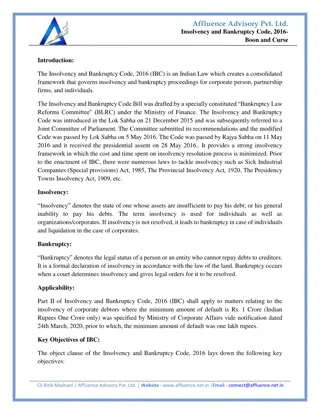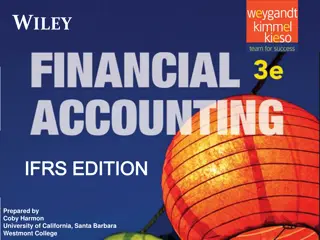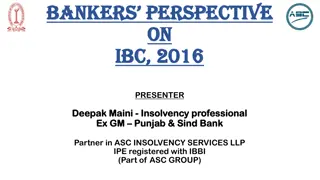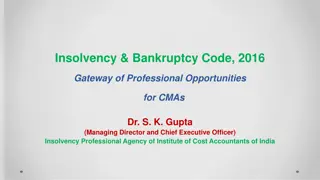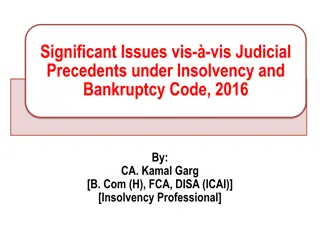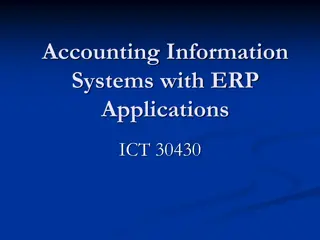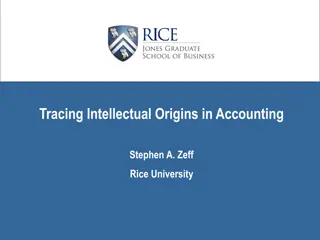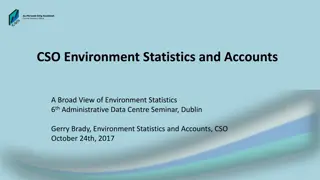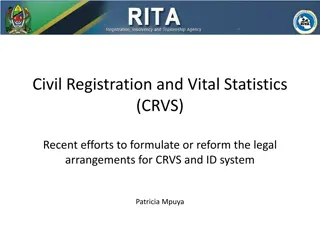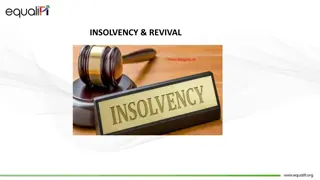Insolvency Accounts and Laws in Financial Accounting
Insolvency in financial accounting refers to the inability to pay debts when they fall due. This article covers the meaning of insolvency, the criteria for being declared insolvent, the Insolvency Act in India, and its applicability to individuals, firms, and Hindu Undivided Families. It distinguishes between insolvency and liquidation, highlighting the roles of official assignees and receivers in the process.
Download Presentation

Please find below an Image/Link to download the presentation.
The content on the website is provided AS IS for your information and personal use only. It may not be sold, licensed, or shared on other websites without obtaining consent from the author. Download presentation by click this link. If you encounter any issues during the download, it is possible that the publisher has removed the file from their server.
E N D
Presentation Transcript
WELCOME CLASS: B.COM PART-1 SUBJECT: FINANCIAL ACCOUNTING TOPIC: INSOLVENCY ACCOUNTS CONCEPTS, INSOLVENCY ACT AND INSOLVENCY PROCEDURE Prepared By Dr. SHAHID IQBAL Guest Faculty Marwari College, Darbhanga, Mobile no. and Whatsup no. : 7004160257 Email ID: shahidlnmu@gmail.Com 1
Meaning of Insolvent Normally, a person is said to be insolvent when he is unable to pay his debts as they fall due because his liabilities exceed his assets. In other words, when a person becomes heavily indebted due to various reasons and it becomes impossible for him to pay his debts fully, he takes shelter under the Insolvency Act. In other words, a person is said to be insolvent when he commits an act of insolvency, i.e., refuses to discharge a debt of Rs. 500 or more; transfer all or substantially all his property to a third person with the intent to defeat or delay his creditors; remains out of India, departs from India, departs from his dwelling house, secludes himself with the intent to defeat or delay his creditors; notifies his creditors that the payment has been suspended or is about to be suspended, etc. 2
Definition of Insolvent A person, who fulfils the following two conditions, is called insolvent : 1. His liabilities should be more than his assets, and 2. He must be adjudged insolvent by a competent court. On the basis of above discussion, we can say that a person has liabilities more than his assets but he can not be said insolvent unless he has not between declared insolvent by the court. 3
Insolvency Act in India: In India, insolvency is governed by two Acts, viz. : 1. Presidency Towns Insolvency Act, 1909 : This act applies in the presidency towns of Mumbai, Chennai (Madras) and Kolkata (Calcutta). 2. Provincial Insolvency Act, 1920 : This Act applies in whole of Indian except the presidency towns of Mumbai, Chennai (Madras) and Kolkata (Calcutta). If the name of the Act and any one of the towns of Kolkata (Calcutta), Mumbai or Chennai is not mentioned in the question, then Provincial Insolvency Act, 1920 will be applied. Insolvency Act is applicable to individual, Hindu undivided family, firm and association of persons but it is not applicable to companies, co-operative society, institutions registered under Society Registration Act and minors. 4
In short, above Insolvency Acts are applicable to any Individual, Partnership Firm, and Hindu Undivided Family only. Companies Act, 1956 applies to Joint stock companies and the term liquidation is used instead of Insolvency. In case of insolvency, a person is not able to pay his liabilities but in case of liquidation, company may be liquidated even it has the sufficient amount to pay its liabilities. The insolvency proceeding will be conducted by the official assignee in presidency towns and by the official receiver in other places. 5
Difference between both Acts Basis of Difference 1. Government dues Presidency Towns Insolvency Act 1909 All Govt. dues are considered preferential. Provisional Insolvency Act 1920 Here also all Govt. dues are treated as preferential. Here also these payments are preferential. 2. Legal liability The compensation payable under Factories Act, Workmen Compensation Act etc. are preferential The maximum amount per head is Rs.300 3. Salary due to clerks during The figure is Rs. 20 per head. 4. Wages due to workers during the last four months 5. Rent The maximum amount per head is Rs.100 The figure is Rs. 20 per head One month s rent is preferential R Rent is treated unsecured. 6
Insolvency Procedure: The insolvency procedure under Indian low is quite simple as explained below : 1. Petition : The petition may be filed either by the debtor or by the creditors in a court having jurisdiction under this Act. This petition must be in writing and verified in the prescribed manner. (A) By Debtor : A debtor can file a petition in the following circumstances : (i) His debts amount to five hundred rupees or more, or (i) He is under arrest or imprisonment in execution of the decree of any court for the payment of money, or (ii) An order of attachment in execution of such decree has been made and is subsisting against his property. 7
(B) By Creditor : A creditor can file a petition against a debtor in the following circumstances : (i) The debts owing by the debtor to the creditor amounts to five hundred rupees or more; (i) The debt is a liquidated sum payable either immediately or at some certain future time. (ii) The act of insolvency on which the petition is grounded has occurred with 3 months before the presentation of petition. (2) Adjudication order of Insolvency by the Court : When an insolvency petition has been admitted, the court shall make an order fixing a date for hearing the petition. If the court is satisfied that the petition is reasonable, it shall make an order of adjudication. 8
(3) Effect of an Order of Adjudication : On making the order of adjudication, the whole of the property of the insolvent shall vest in the court or in a receiver who is appointed by the court and shall become divisible among the creditors. 9
THANK YOU 10

 undefined
undefined
















